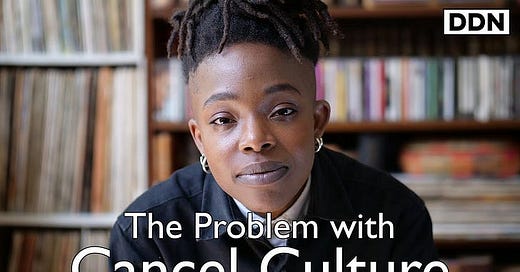Happy Friday!
It’s back to our regularly scheduled programming today, after last week’s bonus edition. For new subscribers (hello!) expect a weekly scoop of three recommended articles with discussion, a clutch of “quick links” and then whatever else dribbles out of my brain.
This week’s callout: readers of Difficult Women will know that Maureen Colquhoun, the first openly gay MP, turns 92 next month. She lost her partner of 45 years, Babs, the week the book came out, and has recently been ill. I would like to send her a birthday card with some messages from readers inside, so she knows that people appreciate her bravery, and remember her achievements. If you liked her story, and would like to send a note of appreciation, email me (hit reply to this). Hopefully I can include some cheering messages with my card.
Helen

What’s Your Pronoun? (LRB)
I’ve had the wrong pronouns used for me – ‘he/him’ instead of ‘she/her’ – by two people, as far as I know. One of them was an editor at this paper, who I am told used to refer to me as ‘he’ when my pieces passed through the office. In his mind only men were philosophers. The other was Judith Butler. I had written a commentary on one of her books, and she wrote a reply to be published along with it. In the draft of her response, she referred to me by my surname and, once, as ‘he’. Just a few lines later she wrote: ‘It is surely important to refer to others in ways that they ask for. Learning the right pronoun ... [is] crucial as we seek to offer and gain recognition.’ I wrote her a meek email – this was, after all, Judith Butler – pointing out the error. She replied not twenty minutes later: ‘Sorry Amia! I always did have trouble with gender.’ Swoon.
Enjoyably wonkish article about the search for a gender-neutral third person singular pronoun (ie, not he or she).
Absolutely loving this flex: “In the UK, the 1867 Reform Act extended the franchise beyond property-owning men with the words: ‘Every Man shall ... be entitled to be registered as a Voter.’ Seventeen years earlier, in 1850, Parliament had passed the Interpretation Act, which said that, for the purposes of the law, ‘Words importing the Masculine Gender shall be deemed and taken to include Females.’ Taken together, these two Acts appeared to guarantee some British women the right to vote. Conveniently, they did not.”
And this one: “In 1978, a school board in Florida formally adopted e, together with the accusative form ir. The board offered the following dialogue to show teachers how to use the pronoun, apparently unaware that it was encouraging them to speak in a Dorset accent:
question: Why did e miss ir bus?
answer: E was afraid to go home.
question: Who was e with?
answer: E was by ir self.”
Chaser: For more linguistic wonkery, here’s Kwame Anthony Appiah on the case for capitalising “Black”. (Atlantic)
Marty Baron vs His Reporters On Twitter (NYT)
The report, which was circulated in April, described Post management as “ill-equipped to deal with social media in the modern era” and suggested that managers are more forgiving of mistakes “by white men and newsroom stars than they are of women, minorities and less high-profile reporters.”
(The Times, where management has cultivated stars and taken a relatively softer line on Twitter, has its own challenges, and was forced last week to try to purge the vitriol from its internal conversations on Slack. Its chief executive, Mark Thompson, asked employees to avoid “saying insulting and threatening things about co-workers.”)
American newsroom culture is very different to Britain’s in some ways . . . and very similar in others.

Don’t Build Roads, Open Schools (Atlantic)
So why don’t we hear about [childcare] when politicians talk about infrastructure? Why all the high-visibility jackets and mechanical diggers? In Britain, it is partly about posh male politicians wanting to seem in touch with regular people: If you went to an exclusive school, as Johnson did, it doesn’t hurt to look like you know which end of a forklift is which. Plus, hard hats still belong to a man’s world—90 percent of construction workers in Britain are male—so they project a kind of macho strength.
The latter point is perhaps the real problem here. In a society where the prime minister is asked whether he “helps” with changing nappies for his newborn child, the idea of child care as women’s (unpaid) work holds the issue back in political discussions. It’s not treated as a real job. Child care seems intangible and mundane—not a new beginning, not “shovel ready,” not something you can stand next to in a hard hat.
Yeah, it’s me. On childcare as infrastructure.
Articles That Changed How I Think
Some reader suggestions: John Rentoul offers this piece, on rejecting hardcore conservatism. Lee nominates “Gender Is Not A Spectrum” by Rebecca Reilly Cooper, saying: “Whatever the feminist equivalent of red-pilling is, this was it.” Lawrence nominates another SSC piece, “We Are All MsScribe”. Further suggestions welcome: just hit reply.

Buy Difficult Women. Someone’s got to.
Quick Links
“I have rape-colored skin. My light-brown-blackness is a living testament to the rules, the practices, the causes of the Old South. If there are those who want to remember the legacy of the Confederacy, if they want monuments, well, then, my body is a monument. My skin is a monument.” Beautiful piece on the statue debate (NYT).
Ian Leslie pointed me towards this list of quotations, gathered by Paul Graham. One jumped out:
“From this place she sent into the world those novels, which by many have been placed on the same shelf as the works of a D’Arblay and an Edgeworth.” – Henry Austen on his sister Jane, in a preface to Persuasion.
I suppose the point of this is supposed to be, hahaha, D’Arblay and Edgeworth, who remembers THOSE LOSERS? That made me sad, because D’Arblay is better known by her unmarried name, Frances Burney, and her Evelina is a funny and sharp novel in its own right, never mind the connections to Austen. (She also wrote an incredible account of her mastectomy without anaesthetic.) Maria Edgeworth’s Belinda is much broader in its comedy than Austen’s scalpel-nicks, but I love it. If you find yourself wishing there were more Austen books in existence, try either of those.
“Who threw the first brick at Stonewall?” No one knows. There might not even have been a brick.
“There is no model for my kind of post-presidency,” [Obama] told the aide. “I’m clearly renting space inside the guy’s head.” (NYT)
“Anal lips and mouth lips are very, very similar, so you talk to people, and it starts to bud into a speciality.” Probably not one to read over breakfast.
Just a lovely Carl Reiner story.
“On some fronts, [Dominic Cummings] has achieved exactly the opposite of what he recommends: rather than hiring top scientists, entrepreneurs or coders to staff the government machine, he has filled No10 with alumni of think-tanks and newspapers, just like every previous administration.” (Hugo Gye in The Critic on the difference between Blog Dom and No 10 Dom.)
“When I look at most of my wardrobe these days, it seems like a curious time capsule from a distant universe. Will future robotic beings pick through my jeans in bemusement, wondering whether tight waistbands were the reason humans died out?” (Financial Times) So much this. My already low tolerance for uncomfortable shoes, stiff fabrics and fiddly crap has been nuked by lockdown. I live in jersey dresses. Even jeans seem a bit much.
Guest gif:

Sensuous dancing or me desperately trying to unknot my shoulders after a day spent working at the dining table? Either way, I’m still enjoying Fosse/Verdon, on iPlayer.



I heard a lesbian spanked you this morning
Did you enjoy being fucked in your arse, whore?